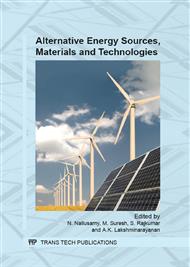p.766
p.771
p.776
p.782
p.787
p.792
p.797
p.803
p.809
Comparative Analysis of Performance and Emission Characteristics of Diesel Engine with Biodiesel Prepared from Waste Cooking Oil and Pongamia Oil
Abstract:
In view of the fast depletion of fossil fuels, the search for alternative fuels has become inevitable, due to huge demand of diesel for transportation sector, captive power generation and agricultural sector, the biodiesel is being viewed as a substitute for diesel. The aim of the present work is to focus on the work done in the area of production of biodiesel from Pongamia oil and waste cooking oil and the characterization of properties of various bio diesel blends in single cylinder four stroke diesel engine. The main problem with biodiesel is its higher viscosity which leads to formation of gums that would affect its performance. The work includes the impact analysis of biodiesel prepared from Pongamia oil and waste cooking oil on engine performance and exhaust emission. The results obtained are compared with the performance parameters of diesel. The experiment is carried out in DI diesel engine equipped with 5 gas analyzer and smoke meter. From the test result, it is found that the use of biodiesel leads to the substantial reduction in particulate emission, CO emissions accompanying with the imperceptible power loss, the increase in fuel consumption and the increase in NOx emission on conventional diesel engine with no or fewer modification. From the results, it can be observed that biodiesel likely to replace diesel as a source of fuel in near future.
Info:
Periodical:
Pages:
787-791
DOI:
Citation:
Online since:
August 2015
Authors:
Keywords:
Price:
Сopyright:
© 2015 Trans Tech Publications Ltd. All Rights Reserved
Share:
Citation:


